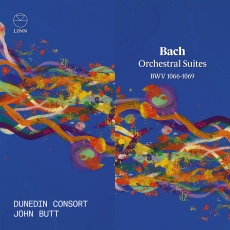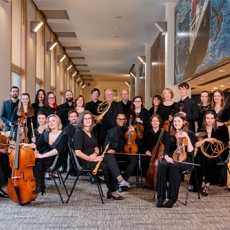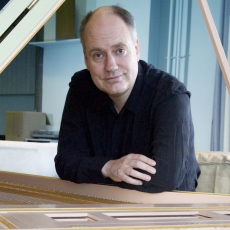Dunedin Consort - Bach: Orchestral Suites - Pizzicato
Diese Einspielung startet mit der dritten Suite und damit an zweiter Stelle gleich dem wohl bekanntesten Satz der vier Werke, dem Air. Zuvor eröffnet die feierlich aufspielende Ouvertüre das Werk. Das Air wird daran anschließend in flüssiger und eleganter Manier dargeboten. Mit feinfühlig formuliertem Ansatz wird der Satz wie gesungen präsentiert und entgeht so mit einer gewissen Schlichtheit trotz der detailfreudigen Durchsichtigkeit einer geschmäcklerischen Interpretation. Die nachfolgenden kürzeren Sätze, die von rhythmischen Motiven geprägt sind, werden wiederum in festlichen aufspielendem Gepräge angeboten.
Bei der Tempowahl beweisen das Dunedin Consort und John Butt als Dirigent jeweils eine geschickte Hand, so dass die Musik in den schnellen Sätzen fließend mit nach vorne gerichtetem Gestus sich immer weiter entfaltet, ohne unnötig zu drängen. Dadurch erhält die Musik einen positiv gestimmten Ausdruck, der sie mit Licht und Wärme strahlen lässt.
Der Beginn der Ouvertüre der zweiten Suite wird geprägt von der markant, fast schon stolpernd akzentuiert vorgetragenen rhythmischen Ausgestaltung. Im weiteren Verlauf dieser Ouvertüre hat dann die Flöte einen solistischen Auftritt der schönen Art, wie er sonst gern mit dem Air in Verbindung gebracht wird. Im anschließenden Rondeau schwingt sich das Ensemble zu einem beseelten Gesang auf. Die Sarabande als langsamen Schreittanz kosten die Musiker mit ruhiger Hand graziös aus.
So bieten Butt und die Musiker vom Dunedin Consort diese vier Werke mit spritziger Leichtigkeit und einem musikalischen Lächeln in einer Sicht an, die zwar eher für den Konzertsaal als für den Tanzboden geschaffen scheint. Aber dennoch gelingt es ihnen ohne Mühe, den Charme, die Eleganz und die höfische Pracht zu zeigen.
This recording starts with the third suite and thus in second place with the probably best-known movement of the four works, the Air. Before that, the solemn overture opens the work. The Air is then performed in a fluid and elegant manner. With a sensitively formulated approach, the movement is presented as if sung, thus avoiding a tawdry interpretation with a certain simplicity despite the detailed transparency. The following shorter movements, characterized by rhythmic motifs, are again offered in a festive playing style.
In their choice of tempo, the Dunedin Consort and John Butt as conductor each demonstrate a smart hand, so that the music in the fast movements unfolds fluidly with a forward gesture, without pushing unnecessarily. This gives the music a positive expression that makes it radiate with light and warmth.
The beginning of the overture of the second suite is characterized by the striking, almost stumblingly accentuated rhythmic interpretation. In the further course of this overture, the flute makes a solo appearance of the beautiful kind usually associated with the air. In the following Rondeau, the ensemble soars to a soulful song. The musicians gracefully savor the Sarabande as a slow scream dance with a steady hand. Thus Butt and the musicians of the Dunedin Consort offer these four works with sparkling lightness and a musical smile in a view that seems more made for the concert hall than the dance floor. But nevertheless they manage without effort to show the charm, elegance and courtly splendor.


